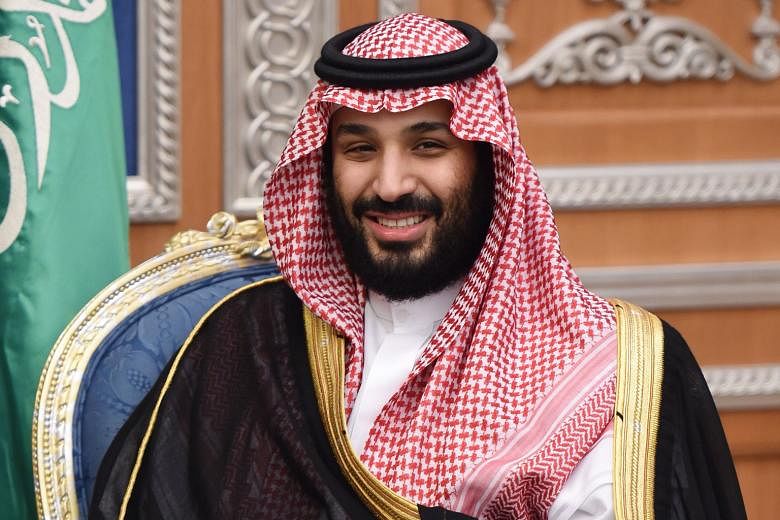RIYADH (Saudi Arabia) • With the tacit backing of his father, Saudi Arabia's 32-year-old crown prince has established himself as the most powerful figure in the Arab world, rushing into confrontations on all sides at once.
Crown Prince Mohammed bin Salman ordered the arrest of 11 princes in his royal family and nearly 200 members of the Saudi business elite, and has begun to take power from the kingdom's conservative clerics. He has blockaded neighbouring Qatar, accused Iran of acts of war and encouraged the resignation of Lebanon's prime minister. And in Yemen, his armed forces are fighting an Iranian-aligned faction in an intractable war that created a humanitarian crisis.
The crown prince has moved so quickly that United States officials and others worry that he is destabilising the region. Signs of potential blowback are growing.
Investors, nervous about his plans, have been moving money out of the kingdom. Prince Mohammed has sought to counter the capital flight by squeezing detainees and others to surrender assets. He has presented the arrests as a campaign against corruption, but his targets call it a shakedown, and he has turned for advice to a former Egyptian security chief who has been pilloried at home for brutality and graft.
Prince Mohammed's supporters say he is simply taking the drastic measures needed to turn around the kingdom's graft-ridden and oil-dependent economy while pushing back against Iranian aggression.
But analysts around the region debate whether the rush might be driven more by a desire to consolidate power before a possible royal succession, desperation for cash to pay for his plans or simply unchecked ambition to put his stamp on the broader Middle East. And despite US President Donald Trump's enthusiasm for the prince, some in the State Department, the Pentagon and the intelligence agencies say they fear that his impulsiveness could both set back his own goals and destabilise the region.
"He's decided he doesn't do anything cautiously," said Mr Philip Gordon, the White House Middle East coordinator under President Barack Obama. But, he said, "if the crown prince alienates too many other princes and other pillars of the regime, pursues costly regional conflicts and scares off foreign investors, he could undermine the prospects for the very reforms he is trying to implement."
The extrajudicial arrests have spooked investors enough, analysts say, to extinguish the prince's plans for a public stock offering of Aramco, the Saudi state oil company, in New York or London next year. It had been a centrepiece of his overhaul.
The crown prince's threats against Iran and Lebanon have raised the spectre of wars that the Saudi military, already bogged down in Yemen, is ill-equipped to fight. Riyadh would be forced to depend on the United States or Israel in any new conflict.
His corruption purge at home, meanwhile, risks alienating parts of the royal family and the financial elite at a moment that would appear to demand unity, either to smooth a succession or to face off against Iran. As many as 17 people detained in the anti-corruption campaign have required medical treatment for abuse by their captors, according to a doctor from the nearest hospital and a US official tracking the situation.
With the decline in the price of oil in recent years, Saudi Arabia has frozen projects and spent more than a third of its financial reserves, draining them to about US$475 billion (S$644 billion) in recent months from a peak of US$737 billion in August 2014. At that rate, the kingdom has only a few years to lift its revenue or slash its spending to forestall a financial crisis.
Against that backdrop, the prince's supporters argue that the anti-corruption campaign aims to recapture hundreds of billions of dollars that have leaked from the state budget through graft and self-dealing - money he needs to fund his development plans.
Prince Mohammed had appealed to the kingdom's wealthy for months to invest in his modernisation programme. But some groused privately that his plans - like a new US$500 billion business hub "for the dreamers of the world," built from scratch and fuelled entirely by clean energy - were ill-conceived and grandiose, and instead of investing at home they quietly moved their assets abroad.
Now, he is no longer merely asking. The Saudi government is pressing some of those detained and others still at large to sign over large sums in exchange for better treatment, according to a US official briefed on the crackdown and associates of the royal family. Saudi authorities estimate they may be able to recover as much as US$100 billion from settlement talks, a senior official told Bloomberg.
Suspects are offered settlements to avoid trial, the official said on condition of anonymity to discuss the ongoing investigation. If they accept, talks are then carried out by a special committee to work out the details. The talks involve the amounts authorities believe suspects have amassed illegally, not their entire wealth, and authorities estimate the state could recover between US$50 billion and US$100 billion, the official said.
Prince Mohammed's supporters argue that Saudi Arabia's recent threats against Iran and Lebanon came in response to provocations beyond his control. As he was preparing his anti-corruption roundup, they say, Teheran's allies in Yemen launched an Iranian-made missile in the direction of Riyadh, where it was intercepted over the outskirts of the city. Lebanese Prime Minister Saad AlHariri resigned the same day with a televised speech from Riyadh that accused Iran and its Lebanese client Hizbollah of sowing "discord, devastation and destruction" in the region.
But many, including current and former US diplomats, say Prince Mohammed's boldness also reflects his conviction that he has the support of Mr Trump.
Mr Trump chose Saudi Arabia for the first foreign trip of his presidency, and Prince Mohammed and Mr Jared Kushner, Mr Trump's son-in-law and adviser, have built such a strong rapport that other US officials say they are not briefed on what the two discuss.
NYTIMES, BLOOMBERG

